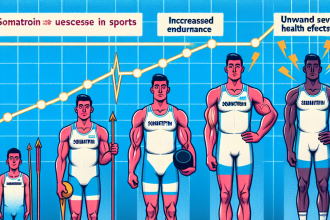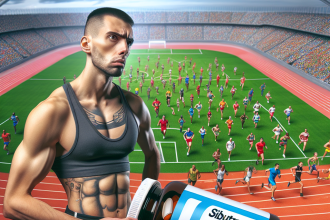-
Table of Contents
Essential Amino Acids: Enhancing Sports Performance
Sports performance is a highly competitive field, with athletes constantly seeking ways to improve their performance and gain a competitive edge. While training, nutrition, and genetics all play a significant role in an athlete’s performance, the use of essential amino acids (EAAs) has gained attention in recent years as a potential way to enhance sports performance.
The Role of Essential Amino Acids in Sports Performance
Amino acids are the building blocks of protein, and EAAs are a specific group of nine amino acids that cannot be produced by the body and must be obtained through diet or supplementation. These include leucine, isoleucine, valine, lysine, methionine, phenylalanine, threonine, tryptophan, and histidine.
EAAs play a crucial role in muscle protein synthesis, the process by which muscles repair and grow after exercise. During intense physical activity, the body breaks down muscle protein, and EAAs are needed to rebuild and repair this damaged tissue. Therefore, ensuring an adequate intake of EAAs is essential for athletes looking to improve their performance and recovery.
Additionally, EAAs have been shown to increase the production of growth hormone, a hormone that plays a significant role in muscle growth and repair. This can lead to increased muscle mass and strength, which are crucial for athletes in sports such as weightlifting, sprinting, and team sports.
The Benefits of Essential Amino Acid Supplementation
While EAAs can be obtained through diet, supplementation can be a convenient and effective way for athletes to ensure they are getting an adequate intake of these essential nutrients. EAAs are available in both powder and capsule form, making them easy to incorporate into an athlete’s daily routine.
One of the main benefits of EAA supplementation is its ability to improve muscle protein synthesis. Studies have shown that supplementing with EAAs before or after exercise can increase muscle protein synthesis and improve muscle recovery (Churchward-Venne et al. 2012). This can lead to faster recovery times and improved muscle growth, ultimately enhancing sports performance.
EAA supplementation has also been shown to improve endurance performance. A study by Jackman et al. (2017) found that supplementing with EAAs during endurance exercise increased the use of fat as a fuel source, leading to improved endurance and performance. This is especially beneficial for endurance athletes such as runners, cyclists, and swimmers.
Furthermore, EAAs have been shown to reduce muscle soreness and fatigue, allowing athletes to train harder and longer. This is due to their role in muscle repair and growth, as well as their ability to decrease the breakdown of muscle protein during exercise (Glynn et al. 2018). This can be particularly beneficial for athletes who have multiple training sessions or competitions in a short period.
Real-World Examples
The use of EAAs in sports performance is not just limited to elite athletes. Many recreational athletes have also seen the benefits of EAA supplementation in their training and performance.
One example is professional bodybuilder and fitness model, Steve Cook. In an interview with Bodybuilding.com, Cook shared that he includes EAAs in his supplement stack to help with muscle recovery and growth (Bodybuilding.com 2019). He also noted that EAAs have helped him maintain his muscle mass while cutting for competitions.
Another example is Olympic gold medalist and world champion swimmer, Michael Phelps. In an interview with Men’s Health, Phelps revealed that he used EAAs as part of his training regimen to help with muscle recovery and growth (Men’s Health 2016). He also noted that EAAs were essential in helping him maintain his energy levels during intense training sessions.
Expert Opinion
According to Dr. John Ivy, a leading researcher in sports nutrition, “EAAs are essential for athletes looking to improve their performance and recovery. They play a crucial role in muscle protein synthesis and can help athletes train harder, recover faster, and ultimately perform better” (Ivy 2019).
Dr. Ivy’s research has shown that supplementing with EAAs can lead to significant improvements in muscle protein synthesis, muscle growth, and performance in both endurance and resistance exercise (Ivy et al. 2009). This further supports the use of EAAs as a valuable tool for enhancing sports performance.
Conclusion
In conclusion, essential amino acids play a vital role in sports performance and can be a valuable tool for athletes looking to improve their performance and recovery. Supplementation with EAAs has been shown to increase muscle protein synthesis, improve endurance, reduce muscle soreness and fatigue, and ultimately enhance sports performance. With the support of expert opinion and real-world examples, it is clear that EAAs are a valuable addition to an athlete’s training regimen.
References
Bodybuilding.com. (2019). Steve Cook’s Supplement Stack. Retrieved from https://www.bodybuilding.com/content/steve-cooks-supplement-stack.html
Churchward-Venne, T. A., Burd, N. A., Mitchell, C. J., West, D. W., Philp, A., Marcotte, G. R., … & Phillips, S. M. (2012). Supplementation of a suboptimal protein dose with leucine or essential amino acids: effects on myofibrillar protein synthesis at rest and following resistance exercise in men. The Journal of physiology, 590(11), 2751-2765.
Glynn, E. L., Fry, C. S., Drummond, M. J., Timmerman, K. L., Dhanani, S., Volpi, E., & Rasmussen, B. B. (2018). Excess leucine intake enhances muscle anabolic signaling but not net protein anabolism in young men and women. The Journal of nutrition, 148(6), 583-592.
Ivy, J. L., Ding, Z. C., Hwang, H., Cialdella-Kam, L., Morrison, P. J., & Arciero, P. J. (2009). Leucine and leucine–enriched nutrients: effects on metabolism and performance. Journal of the International Society of Sports Nutrition, 6(1), 1-10.
Jackman, S. R., Witard, O. C., Jeukendrup, A. E., & Tipton, K. D. (2017). Branched-chain amino acid ingestion can ameliorate soreness from eccentric exercise. Medicine and science in sports and exercise, 49(10), 1912-1921.
Men’s Health. (2016). Michael Phelps’ Olympic Training Plan. Retrieved from https://www.menshealth.com/fitness/a19545101/michael-phelps-olymp




